Write Us
We are just a call away
[ LET’S TALK AI ]
X
Discover AI-
Powered Solutions
Get ready to explore cutting-edge AI technologies that can transform your workflow!

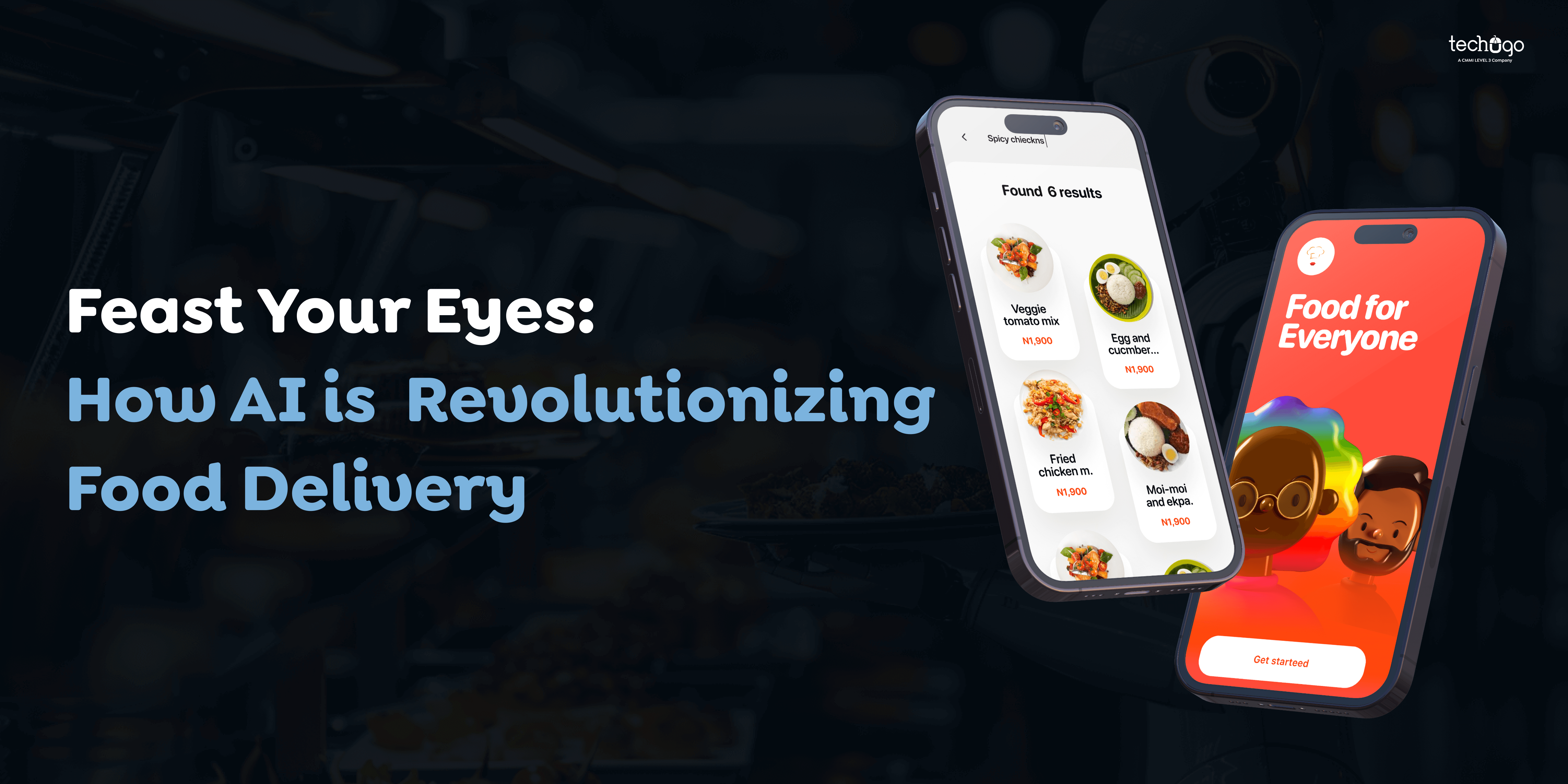
Have you ever had the moments when you’re hungry and dreaming of your most-loved food and the perfect meal arrives at your door? Imagine your company being the one that creates this fantasy for thousands of clients. Investing in developing an app for food delivery can put your business at the top of an exciting company.
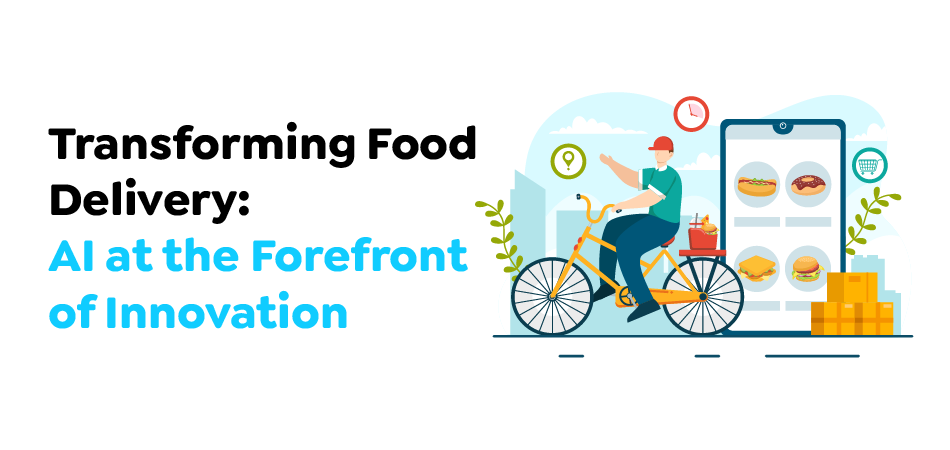
By 2024, Food Delivery App Development Company will use technological innovations more than ever to improve user experience and simplify operations of food delivery apps. The fast-paced and hectic lives of people worldwide are why food delivery apps are being curated for $1.22 trillion by 2024. Developing an AI-powered food delivery system has gained more acceptance among business owners and entrepreneurs. Savvy entrepreneurs know the importance of a steady pace to achieve success. It requires the latest mobile technologies to traverse the competitive landscape and establish a unique market.
AI has transformed the food delivery industry online and is influencing how we eat to ensure that our food is served freshly cooked and hot. We’ll examine the various ways to use AI within the delivery app industry and their role in creating the future for the business.
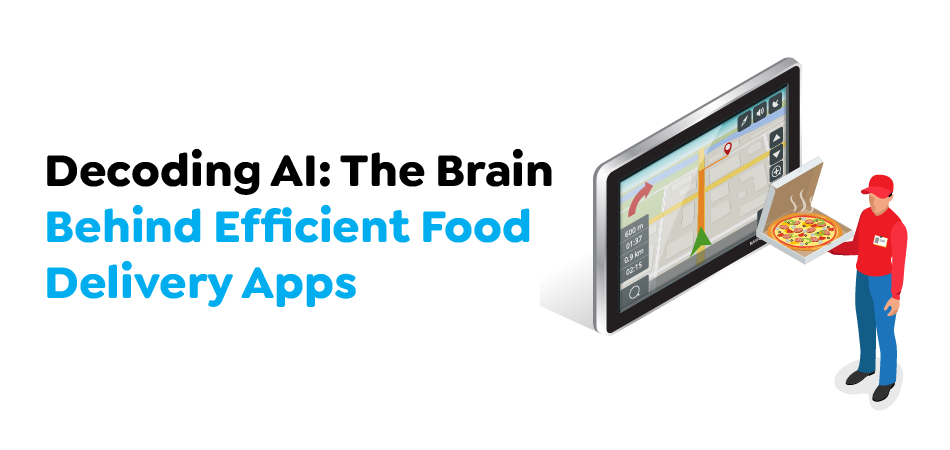
The phrase “artificial intelligence,” more frequently abbreviated to “AI,” describes the technique of imitating human brains for computer programs or robots. This involves the creation of systems and algorithms that allow computers to perform jobs that typically necessitate human expertise. It includes understanding, reasoning, problem-solving, interpreting language, and recognizing patterns.
The application of AI is crucial to food delivery applications. AI can offer high-quality data and information based on records, aiding the planning procedure. When presenting new plans or trends for the future, AI considers everything that could have an effect. The action plan includes all the relevant information, starting with those that are frequently looked up and moving on to restaurants that are the most popularly searched for.
Artificial Intelligence has been an innovation in the application industry, and food delivery is no exception. It is a must-have in the UK, where competition and consumer experience can be very high. AI can accelerate operations, improve user experience, and make the best decisions based on information.
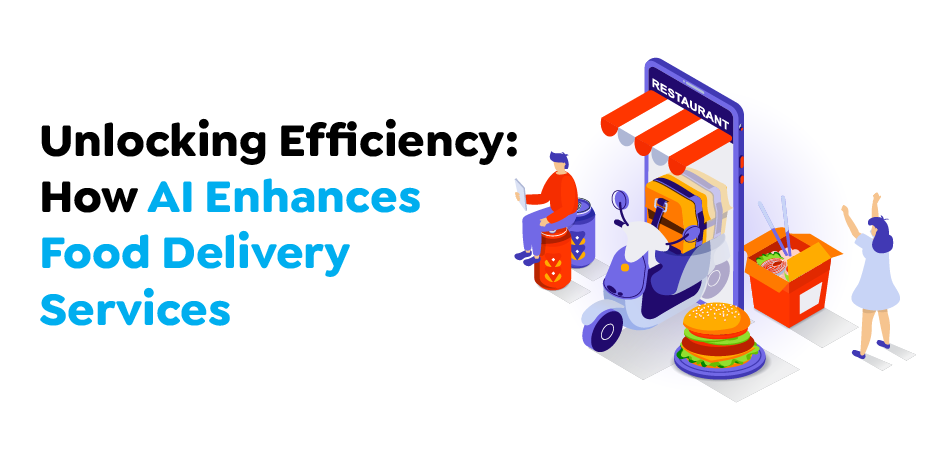
Although AI has been around for a while as a concept for food delivery, companies have only recently begun to implement it often and more confidently. This is because AI technologies could, with less cost than traditional technology, help companies optimize their operations, increase consumer satisfaction, and enhance business efficiency.
AI can automate various laborious tasks, such as making connections between drivers and orders or filling out forms, which are usually time-consuming and have no benefit in this age of intelligent work. Thus, it is unnecessary to consider hiring additional employees or keeping them busy with monotonous work.
Also Read : Reshaping The Shopping Landscape Unveiling The Realm Of Supermarket Grocery and Food Delivery Apps
Your customers will no longer need to wait for freshly cooked food or rush to their destinations because of need. AI often clarifies and allows interaction between the user and your company if delivery is not on time. Furthermore, AI can maintain client relationships with your business in a way that makes it easier for clients to understand what’s happening, what’s going on, and why the process is slowing down.
AI’s transformational impact on the delivery process is apparent through its innovative solutions to improve logistical efficiency and speed up the process. When people are concerned with the food’s quality and cost, they should not worry about that, as AI provides everything on the table in a highly transparent manner. The system keeps users on the same page from purchase to the time it is delivered. That’s the appeal for users, as they’re able to see the delivery driver delivering their food.
Also Read : Developing An On Demand Food Delivery App Like Deliveroo
In the past, consumers could view their live cooking time and receive an update regarding the time of delivery. Additionally, they could communicate with the delivery company to receive the latest information regarding their order and modify it with the aid of AI.
Through the Android phone’s systems, users can quickly create an order, control it, or change it according to their needs. This makes the entire process simple. It strengthens the connection between the user and the business for years. It provides the necessary expansion to the new company.
Companies that deliver food Solutions based on AI allow them to develop a more unique and exciting customer experience. Through chatbots and virtual assistants, clients can get quick and reliable service that can quickly address any issues or concerns.
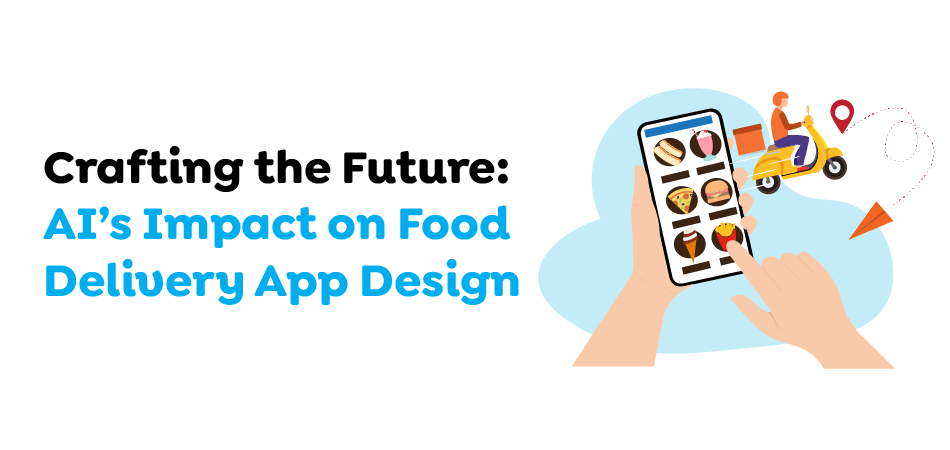
Let’s examine some of the key aspects of artificial intelligence (AI) in applications such as ordering food.
This is one of the main benefits of AI in developing apps that offer food. Artificial Intelligence App Development Company will make AI programs that can analyze previous orders, food preferences, and dietary restrictions to identify the recommended top foods and restaurants. This makes it easier for customers to locate food items that meet their nutritional requirements and preferences.
Personalized suggestions will enhance the user experience, make people happy, and prompt the customers to place orders again. This feature makes food service apps stand out and offers customers a distinctive experience. AI programs can provide recommendations based on the timing of the day, conditions, and even where they are.
Artificial Intelligence-powered robots are the mainstay of food delivery app development. Customers can use chatbots to order food, monitor the delivery of their food, and receive assistance from customer service. The chatbot can also offer recommendations based on previous orders made by users, their taste preferences, and any restrictions on nutrition they might have.
Also Read : How Much Does A Food Delivery App Like Hungerstation Cost?
Chatbots can handle multiple modifications in a single session, which allows food delivery applications to offer rapid and effective customer support. They can help with simple inquiries and send more difficult queries to customer service reps. Additionally, they can cut down wait intervals, run the process smoother, and enhance the user experience. This function assists businesses in providing support to customers 24/7, without the assistance of an individual.
AI algorithms can analyze more information to determine customers’ behavior and patterns, which aids food delivery services in improving their service. Predictive analytics also aids food delivery companies in determining what customers want and ensuring they have positive service.
For instance, the AI program can predict the busiest times during the day and the most popular meals. These data points can aid food delivery companies in identifying the most effective method of providing meals and distributing employees more effectively. Predictive analytics help food delivery apps predict demand and ensure they’re stocked up with staff and food to satisfy customers’ needs.
Also Read : How To Build a Successful Food Delivery App Like Uber Eats Essential Step and Feature?
The integration of Artificial Intelligence in food ordering applications can help businesses reduce delivery times, increase customer satisfaction, and generate more revenue. This can make it much easier for companies to efficiently manage their resources and cut down on running expenses.
It’s AI software that allows computers to process images of things. Food delivery applications can use the ability to recognize images to identify which ingredients and meals appear featured in photos posted on social networks. This data can be used to aid food delivery services in enhancing their recommendations and providing their customers with more details.
Incorporating AI in food delivery apps developed by firms helps them deal with scams within their applications. Food-detection algorithms look for trends in consumer behavior to stop fraud, such as fraudulent transactions and credit cards. It will identify suspicious IP addresses through fingerprints. The fraud detection algorithm can prevent food delivery services from losing money and maintain track of customer details. They can make their predictions more accurate by taking care of counterfeit orders and identifying fakes.
Also Read : Dont Hold Back Here Is A Guide To Food Delivery App Development
Food delivery apps online examine places such as bars, cafes, restaurants, and other establishments that receive lots of feedback and ratings on social media platforms. Furthermore, AI suggests a nearby café or restaurant and ensures that users select that location according to the information in the database currently. Therefore, the food delivery application firm integrates AI for efficient result-based search.
Over 27% of all internet users prefer voice search to typing their own. People looking to find out about eating places and order food will likely utilize the service more. Food establishments could benefit from technology such as Amazon Alexa to let customers shop from anywhere and anytime without needing to do everything.
AI can also make it possible for computers to recognize human speech and words, which is an additional function of AI when it comes to app development. Food delivery. This can aid food delivery applications in resolving customer issues and gaining important data. NLP is also able to assist food delivery applications in resolving problems with users and providing suggestions based on these concerns.
Algorithms could determine the most efficient transport routes depending on distance, speed, and the flow of traffic. This can help speed up delivery, use less fuel, and reduce the cost of delivery. To ensure the optimal service to the nearest distribution company while at the same time expressing the customer’s request, the optimization process can be carried out according to data-driven insights.
AI is utilized to create more appealing lists of items that customers can choose from. Customers are also being asked to change the way they process orders. Once the program has these details, it reviews it in the background to determine if it has any issues. Food delivery apps developed by the firm can utilize AI software to ensure that good events occur.
Also Read : AI Apps Powering The Future Of On Demand Work
Implementing AI in food service apps could save time and cash by delivering results. AI utilizes machine learning (ML) and facial recognition technology to identify whether food items are out of stock, out of season, damaged, or deteriorating. It informs change personnel so that they can address the issues and respond promptly.
Also Read : Unleasing The Power Of AI Transforming Software Development With Machine Learning
Through the introduction of AI algorithms in food service applications, companies can make fast and effective decisions. Businesses can now know what the current trends in the market are and then plan accordingly. The data also aids catering companies in choosing the best places to include on their agendas. These decisions are made using data gathered from customers as well as AI programs.
Artificial Intelligence (AI) can be employed to monitor and ensure hygiene standards are adhered to in the food preparation area. Install cameras with computer vision software powered by AI that detect hygiene violations, such as employees not wearing gloves, not covering their heads, and insufficiently washing hands, and alert management to take appropriate action.
Artificial Intelligence-driven sensors monitor food temperatures during delivery. Suppose the temperature is beyond the specified range. In that case, the system will inform the driver and the relevant restaurant to take the appropriate steps to resolve the issue.
Food delivery apps use artificial intelligence to learn about customers’ preferences and suggest dishes that consider their taste and diet preferences. Additionally, algorithms that learn from machine learning can detect popular foods and suggest them to customers who might not have had the chance to try them previously, thus growing sales overall.
Also Read: Key Advantages Of Using Artificial Intelligence in The B2B Space
A third of the food produced globally is in the trash due to poor management of inventory information, incorrect orders, and excessive preparation. In this case, AI helps save the day of these apps by analyzing the inventory and sales to assist you in determining what’s necessary. Additionally, AI reduces the consumption of food by forecasting demand.
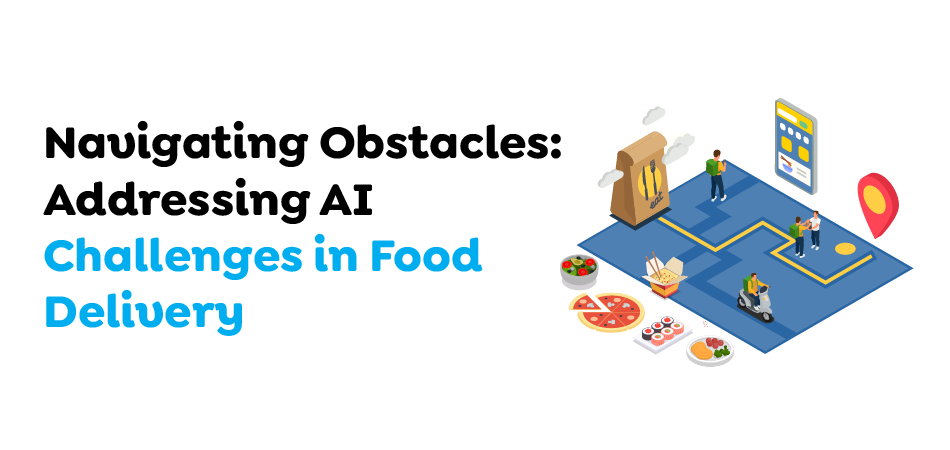
AI-powered food delivery has transformed the food business. However, it takes work. There are significant obstacles that must be overcome to make sure AI’s full power is at our fingertips:
AI excels when it works with high-quality, massive databases. Information gathered from the food sector isn’t always efficient. Multiple farms, different weather conditions, and perishable items need to be more uniform in terms of statistics. Additionally, certain corporations might not divulge proprietary recipes or knowledge about the production of food.
Artificial Intelligence-integrated food delivery apps can function as white boxes that generate outputs but do not reveal the reasoning behind their operation. The lack of transparency could cause serious harm to the safety of food. In the case of an instance, for example, when an AI software flags a particular portion of potentially infected food. It’s crucial to know why and then make corrective steps to keep consumers’ trust.
Also Read : Waayu Food Delivery App Suniel Shetyy Launches A Competitor For Swiggy And Zomoto
To properly integrate AI and make it work, a different kind of person is needed to be skilled in the science of data and AI in food processing. Based on Android and iOS service providers for app development, the gap between the existing workers and the skills needed to make the most of AI integration is an obstacle of significant magnitude.
Generative AI Software for ordering food creates ethical concerns, specifically regarding bias. For example, if AI-customized meal recommendations are made, could they encourage poor consumption patterns in certain groups of people? What can we do to ensure that AI will not increase differences in food systems?
The constant evolution of AI is making it challenging to develop clear guidelines. Consumer protection and food safety regulations must adapt to the possible threats created by AI-driven methods. App development companies that offer mobile apps should ensure that their food delivery apps adhere to regulations and maintain security standards.
Developing and deploying AI for food delivery apps could be expensive. Small—and mid-sized food companies might be unable to afford the infrastructure required and develop skills, thus widening the technological disparity between large and smaller players in the market.
Also Read : The Cost To Develop A Flutter App Unlocking Growth And Success
The automation of AI may result in the loss of jobs in specific areas of the food industry. According to the Food Ordering App Development Company that develops hybrid application developers, although AI could open many new possibilities, methods are necessary to help those whose jobs are impacted by technological advancements.
Also Read : Restaurant Mobile App Development Ordering and Delivery Made Easier
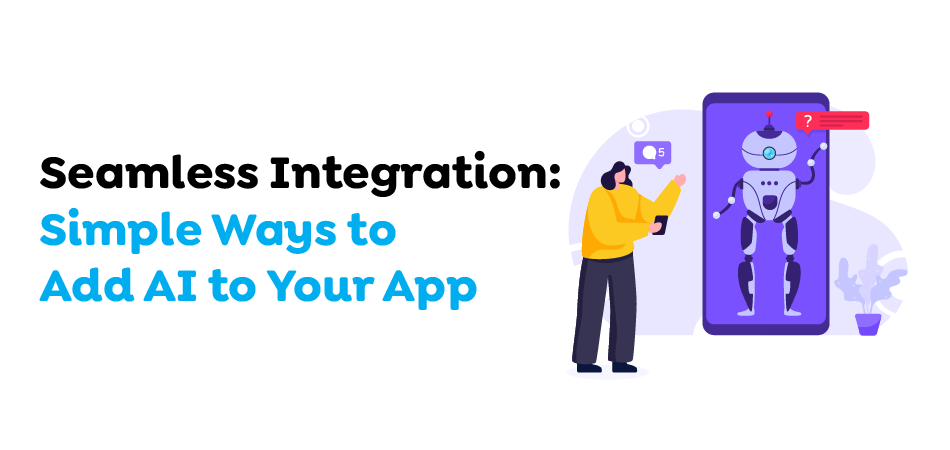
When we consider our future in food delivery, we can see that AI is a promising option for improving the efficiency of restaurants and making deliveries quicker. Integrating AI provides a lucrative business opportunity and can transform the customer experience. This technological advancement is not only concerned with getting food delivered; it’s about creating a positive experience for customers.
Let’s consider a few options!
Utilize AI to study customer data like previous orders, search histories, and purchasing patterns. These data can be utilized to customize menu recommendations that improve customer experience and increase the volume of orders.
Also Read : Building a Personal Trainer in Your Pocket Crafting An AI Fitness App Like Apptiv
Use AI to enhance delivery routes and schedules in real-time updates. By analyzing factors such as the traffic situation, the delivery location, and the quantity of queued orders, your application can identify which routes are most effective in reducing delivery times while increasing customer satisfaction.
Implement AI-powered chatbots for customer queries and concerns. They can answer frequently asked questions instantly, help with ordering, provide solutions to the most common problems, and improve the overall customer experience.l
Also Read : How Chatbots Make E-commerce Marketing More Effective?
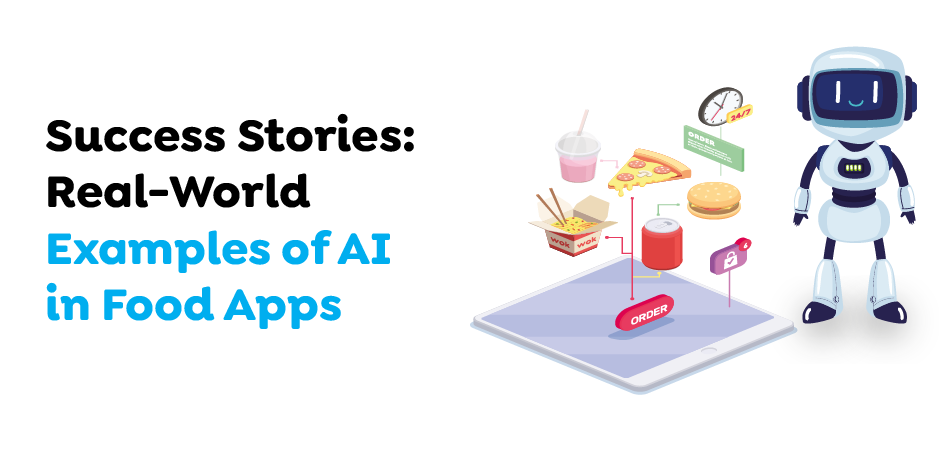
These apps seamlessly incorporate AI to enhance our dining experience, from personalized recipes to cooking tips for advanced cooks.
Yelp utilizes artificial intelligence to improve its users’ dining experiences. The app tailors recommendations by studying individual reviews, location information, and ratings. In addition, by analyzing users’ patterns and preferences, Yelp’s AI improves the quality of restaurant recommendations by creating a customized eating experience.
Additionally, Yelp’s AI capabilities surpass the scope of analyzing reviews and identifying trends. It can also provide valuable information about potential food allergies or diet restrictions. This not only increases the user experience but also increases the security and enjoyment of your dining experience.
Samsung Food AI apps focus on improving the cooking experience by adjusting and learning to the user’s preferences. They use artificial intelligence to suggest recipes based on the person’s preferences, ingredients available, food restrictions, and food allergies. This customized approach simplifies cooking and helps promote healthy food habits. Its USP is its versatility and adaptability, which makes it a fantastic option for people with unique food requirements.
Uber Eat is the epitome of the app for the food delivery sector. It uses AI software app development to simplify delivery routes and forecast time with precision. It employs machine learning algorithms to analyze customers’ preferences and recommend specific food options. Furthermore, Uber Eats launched an AI-powered assistant last year to help users find bargains and learn about various food choices. The AI robot can also respond to user queries, offer suggestions, and even repeat a food order.
Swiggy’s reliance on AI has undoubtedly opened the door for a truly exceptional customer experience. Additionally, Swiggy is developing Generative AI-driven solutions for its community of delivery and restaurant partners, such as copilots for X. Account managers will be able to engage in meaningful conversations with partners at restaurants and enhance delivery logistics by using route plans and forecasting demand. In simple terms, Swiggy is making it simpler for consumers to access the foods they crave using AI.
Also Read : Ship Management Software Reshaping The Logistics Industry Harnessing The Potential
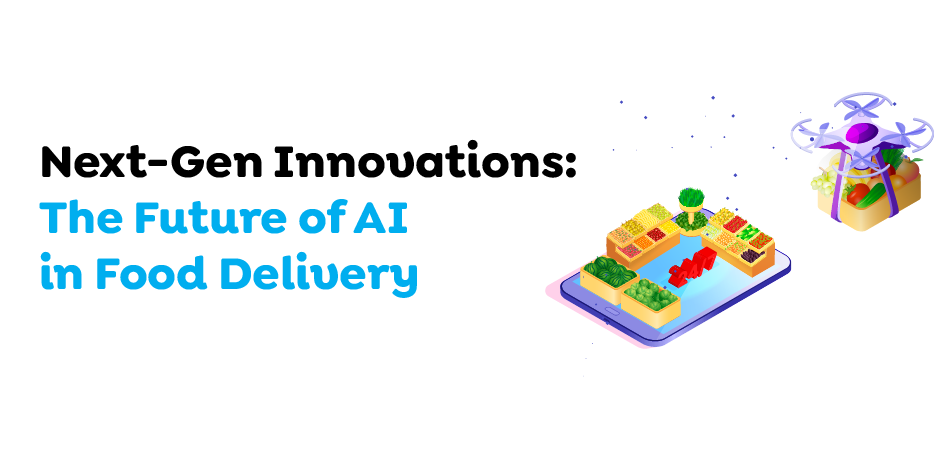
Artificial Intelligence (AI) offers promising prospects for food delivery applications. As technology improves, amazing and unexpected results will be revealed, encouraging companies to choose it. Food delivery services will be more adept at analyzing users’ preferences, data, and patterns to create an extremely customized and intuitive experience. Integrating the Internet of Things (IoT) with AI will allow for rapid, real-time tracking and routing optimization and intelligent distribution of food through connected devices.
Also Read : IOT Brewing Innovation in The Food Beverage Industry
As AI evolves, it is possible to see new and innovative solutions in food delivery. There are many exciting options:
AI can anticipate users’ needs according to factors such as the timing of the day, weather, or celebrations. Imagine that your app suggests food options for a birthday celebration or perhaps a soothing soup for a day of rain.
Though still in their early stages, autonomous drones and vehicles armed with AI could revolutionise food delivery services. They drastically reduce the time required to deliver food as well as costs.
Also Read : Intercity Food Deliveries is The New Experiment Of The Industry Heres More
AI can go far beyond catering to your entire experience. Imagine apps suggesting certain dishes in response to the weather or restaurants by a person’s state of mind.
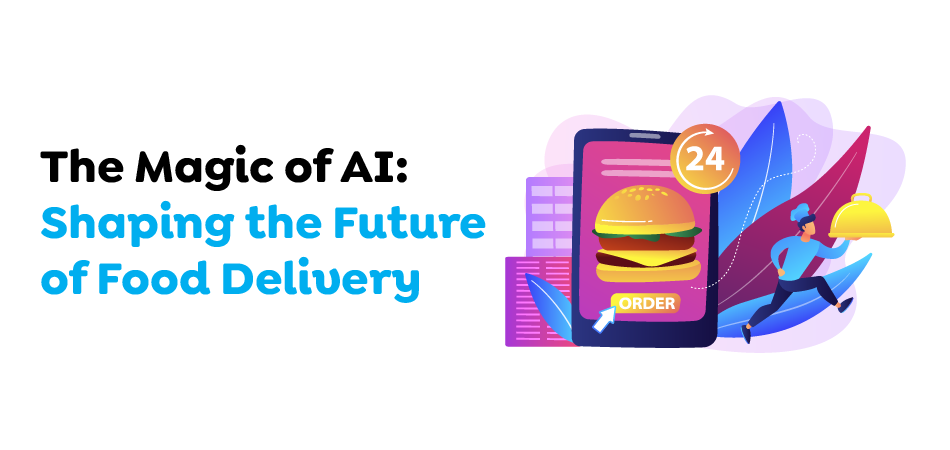
Imagine creating a smooth food delivery experience that is almost like magic. Thanks to AI, that’s not simply a dream but an actual real-world learning experience. Incorporating artificial intelligence into food delivery applications makes it possible to transform this idea into reality. By personalizing user experience by optimizing processes and opening up new opportunities, AI can provide the fastest, most convenient, and, ultimately, a more pleasant eating-out experience for all. As AI technology develops as it does, the next generation of apps for food delivery promises to become more sophisticated, enjoyable, effective, and efficient.
Since a Restaurant App Development Company who have worked on similar projects will help make your project more efficient, we suggest looking for those in similar projects in the same industry. This way, they’ll bring experience that can lead to higher efficiency and success in the implementation.
Partner with Techugo to craft intelligent, efficient, and user-centric food delivery apps tailored to your unique needs. Leverage our advanced technology and innovative solutions to deliver a seamless user experience. Our expert team guarantees exceptional functionality, robust security, and captivating design, positioning your app for success in the competitive landscape. Get in touch with our team and transform your vision into reality with us and stand out from the competition.
Write Us
sales@techugo.comOr fill this form